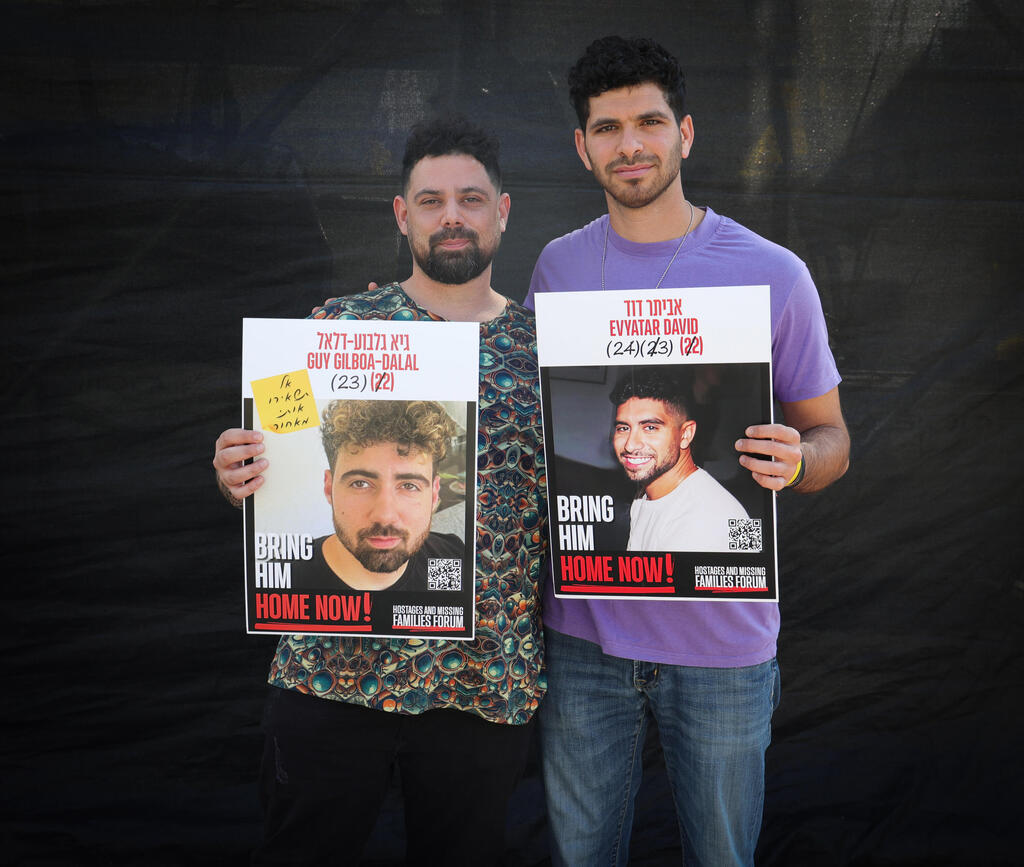Getting your Trinity Audio player ready...
"They're begging for their lives, watching their friends being released, and then the door is slammed in their faces, throwing them back into the tunnel": This is how the cruel video of their younger brothers, Evyatar David and Guy Gilboa-Dalal, pleading for their lives while watching the release ceremony of other hostages, reached Ilay David and Gal Gilboa while they were in the U.S. as part of their joint efforts to bring their brothers and all the other hostages home.
"We were sitting in an auditorium watching a speech by Trump," Gilboa recounts. "We saw the images while Trump was speaking, also about the hostages. Our phones started going crazy, and we saw the videos—it shook everything. It was very stressful, very frightening and very frustrating. We started watching it without sound. Of course, we immediately recognized them. Ilay said, 'Wait, let's go outside and look,' but it was hard for him. I couldn’t hold back, and in the end, we watched it together. There were senior officials from the White House there, and we showed it to as many of them as we could. They were horrified."
Evyatar David and Guy Gilboa-Dalal begging to go home
He adds, "My mom didn’t want to see the video—they were hysterical at home. This was one of the things we feared seeing the most."
"At home, everything fell apart—my mom and sister lost it," David continues. "There are a lot of mixed emotions here. On one hand, it’s a first sign of life from Evyatar. On the other hand, suddenly you see their expressions—they’re literally begging for their lives. You see their friends being released, and then the door is closed in their faces before they’re thrown back into the tunnel. You realize this is the first time they’ve seen daylight in months. It’s devastating."
Get the Ynetnews app on your smartphone: Google Play: https://bit.ly/4eJ37pE | Apple App Store: https://bit.ly/3ZL7iNv
"I immediately wanted to go out into the world and scream for them to bring Evyatar and Guy back to us. We haven't seen them in 500 days. We haven't heard their voices," says Gilboa. "Despite all the difficulty, it also gave a certain hope. They’re alive, and they’re together. It feels so close, but they’re still so far away—it’s maddening. You can’t cope with it." David adds, "We tried to find the good in it, maybe even laugh about it—it’s clear they’re playing along, and they’re terrible actors."
"I thought about coming back to Israel," Gilboa says, "but this caused such a media storm, and we realized that because of the video, we could stay and continue our work. We tried to leverage it, to show everyone the cruelty of their captors, who are mentally torturing them. We’re not politicians. We’re appealing to people’s hearts first and foremost, and it served us in that way. But the psychological toll is enormous—it’s psychological torture."
What else did you see in their faces that perhaps we wouldn’t notice?
David: "Exhaustion, depression, anemia. Hostages who returned and were with them told us this as well. We got indications from those who were released that they’re not in good health. You can see it—their eyes are dark, lifeless. They’re half the people they were before. They’re exhausted, depressed, in an extremely difficult mental state.
"And that’s just the preview. After hearing testimonies from those who’ve returned, I’m broken. I now know in detail what my brother is going through there. I know that every day, he walks through an 11-meter-long tunnel, one meter wide, with a hole for waste. The only advantage to being underground is that they’re not threatened by IDF bombings. Other than that, it’s the worst kind of hell for any human being."
Gilboa: "The condition of both of them is very bad. They both have untreated infections. They don’t see daylight and have restricted movement. Evyatar doesn’t have his glasses. They’re starving."






